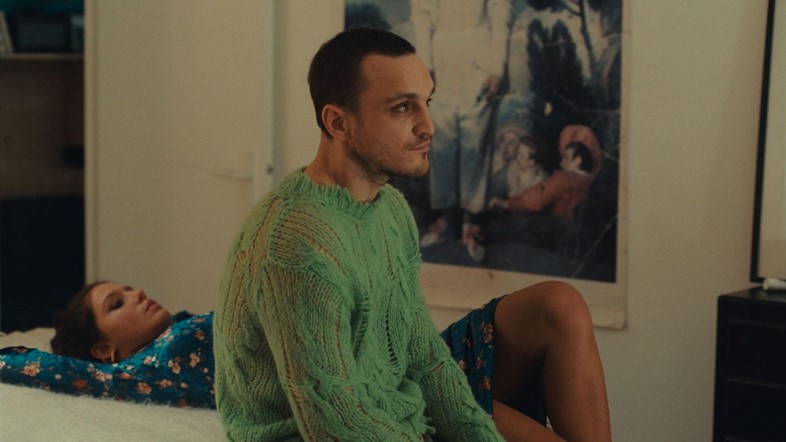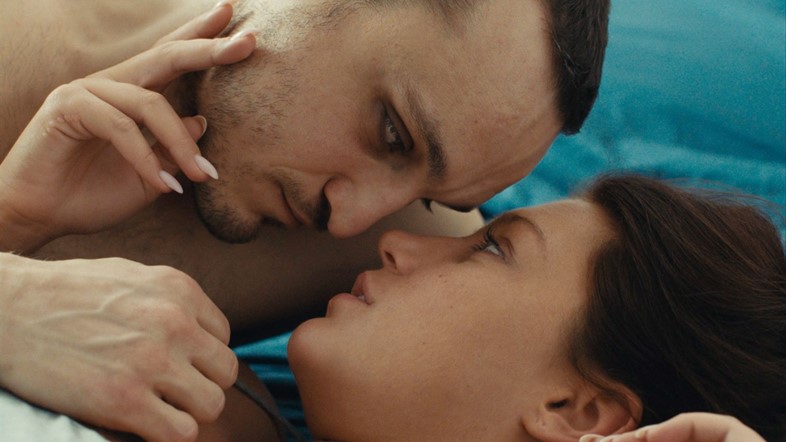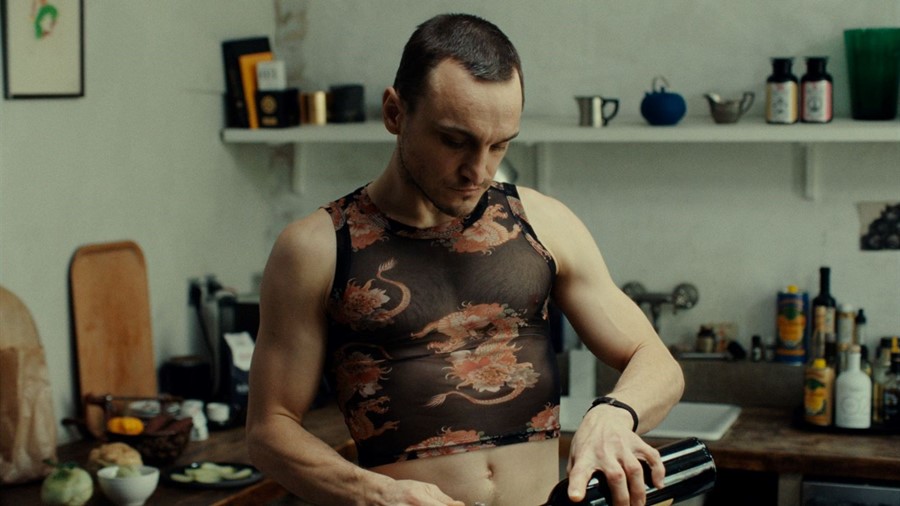As Ira Sachs’ three-way study of desire hits cinemas, German actor Franz Rogowski talks about experiencing real intimacy on set
The inspiration for Passages, Ira Sachs’ heady, unruly study of desire, all comes back to Franz Rogowski. Seeing the 37-year-old German actor in Michael Haneke’s Happy End – a pulsating, sometimes electrifying film which Sachs says has “life in it” – during the pandemic made Sachs crave the life and intimacy offered by a certain kind of “human cinema”.
With Rogowski as his starting point, Sachs set out to craft a similarly tangled love triangle to the one in Luchino Visconti’s The Innocent. In Sachs’ film, the happily married Tomas (Rogowski), an imperious director-auteur, gives in easily to the magnetic pull of schoolteacher Agathe (Adèle Exarchopoulos), paying little mind to the consequences. What ensues is Tomas’s muddled back and forth between husband Martin (former Another Man cover star Ben Whishaw) and Agathe – unable to choose between his real, unique feelings for both, and so carving out a path of destruction wherever he goes.
Despite the turmoil, Passages is an undeniably tender film, testing viewers with leisurely shots, including an unbroken two-minute sex scene between Tomas and Martin. While the script provided the backbone, Sachs wanted to foster a freedom “where the actors become the writers of those scenes” – an ideal type of acting where you “arrive with your soul, and an armour is put on you”. The result is an ode to the inherent messiness of sexuality and the irremediable knottiness of love.
Below, we spoke to Franz Rogowski about having a role written for him, seductive vests, and bringing personal experience to sex scenes.
Miriam Balanescu: How did you feel about the character of Tomas being written for you? Were you at all put out by the fact that he can be a bit of a bully?
Franz Rogowski: Well, he is challenging – and on paper even more so. I was wondering, how am I going to defend his actions? What is it that drives him? We all want something good, something that grows or something that diminishes pain or increases relation. That’s just how we build, so even though he inflicts chaos, what he wants is a safe haven. I didn’t see him as a bully, but he is for sure self-centred to a degree that is painful and, at the same time, lacks a centre and is therefore very dependent on his surroundings. That creates a lot of friction and friction is life to cinema. Friction creates heat, and in combination with life, it’s very good for photography.
When I talked to Ira for the first time and told him I had little time to prepare, he said, “Just learn your lines and we’ll figure out the rest.” Then I was like, “Oh wow, he really thinks I’m Tomas.” To have an artist like Ira calling you and telling you that he wrote a script for you is overwhelming. It’s even intimidating. But then we met, and it didn’t take much time to realise we should just do this together.

MB: Did you think a lot about how the audience would react to this character? Whether they would like him?
FR: We were more inspired [by] the fact that people might be challenged. It was more inspirational to think of Tomas as someone that is hard to put in a box than to try to turn him into something likeable. It’s not really a category for me – I don’t really care. I want this to be alive and complex, and also hard to read. I don’t need you to have an easy time in cinema. But the fun thing is that you can also watch this movie and not think about cinematography, not think about anything – just enjoy the madness.
MB: The fashion in the film is obviously very important, especially the vest. What was the process like of trying on clothes, and then embodying the character?
FR: Yeah, we had an extraordinary costume designer, Khadija Zeggaï. She’s incredible. Costume designer isn’t even the right word, because she used costumes that were from her own wardrobe or her friend’s wardrobe. Now, some of these pieces are in my wardrobe, so it’s a very personal texture that she brought to the table – and it changed us. One of the first rehearsals was a costume rehearsal and we didn’t need to talk much because to get dressed and undressed in front of each other is a great way to get to know someone. Some of the drama for me in this movie is also costumes talking to one another. I keep talking in interviews about the snake leather jacket and the red silk robe: one on the balcony, one in bed, one surrounded by street noises, the other one by classical music.

MB: What conversations did you have with Adèle and Ben before going into the sex scenes?
FR: We all brought our own personal history. Adèle, for example, in Blue Is the Warmest Colour, experienced [intimate] scenes that were challenging for her because they were so overwhelming, so it was important for her to just talk about her experience and share those stories. And for me, there was a very technical aspect; I wanted to get in bed with Ben without explicit shots of my dick. Once we were in bed, I wanted to experience the intimacy, so there was no need to put blankets between us or anything like that. I think we trusted each other to the degree that we always respected boundaries, and we could communicate while shooting – we could also stop right in the middle of a scene. This is what is very helpful: when you feel like, OK, we can start shooting, but this take is not the holy grail. We are on a journey [where] we are all nervous, all in the same boat. But, you know, sex is always a huge undertaking and sometimes the smallest detail can make the difference. If you want this to be perfect sex, it might end up terrible. If you just start with little ambition, it might end up being incredible, orgasmic, very surprising.
Passages is out in UK cinemas on September 1.
